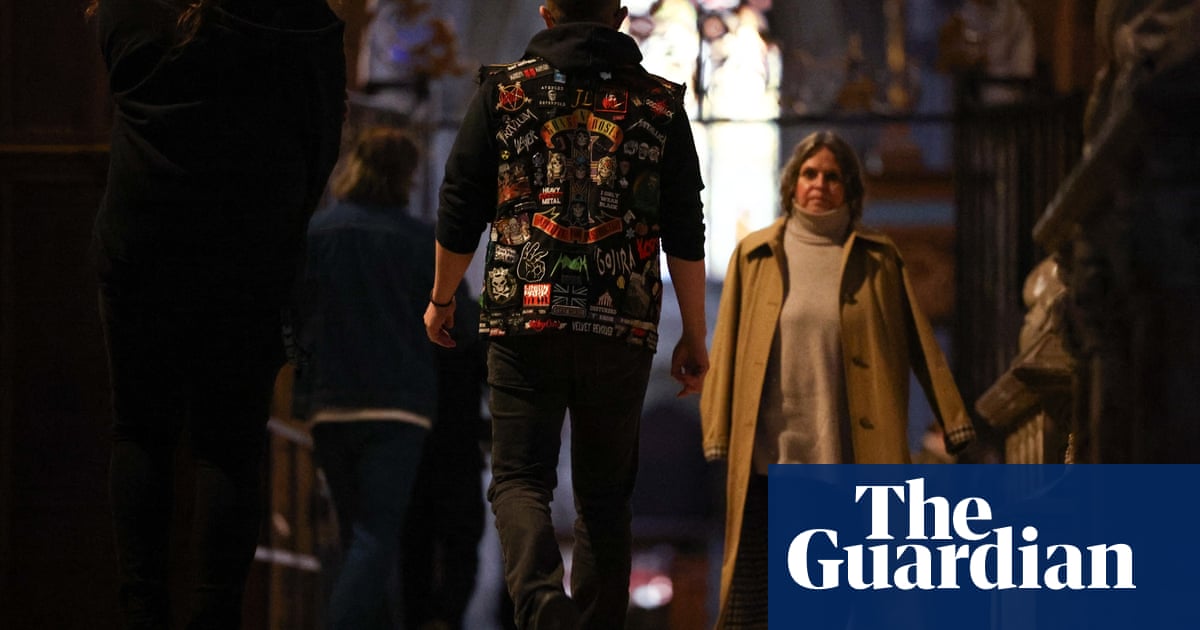Protests at one of the most controversial concerts of the year, labelled “shocking and deeply inappropriate”, failed to materialise on Friday evening, as a metal act performed to a cheering crowd of 1,400 people atYorkMinster.
The 800-year-old cathedral hosted a gig by Plague of Angels, which some of the congregation previously called an“outright insult” to their faithand said they would be protesting if the concert went ahead.
The controversy centred around the guitarist Mark Mynett and another band member, who previously played with Cradle of Filth, a band responsible for what Rolling Stone called “the most controversial shirt in rock history”, featuring a topless nun masturbating and the words “Jesus is a cunt”.
Mynett has since apologised for his association with the band, saying the pair “deeply regret their involvement” with Cradle of Filth.
However, in place of placards outside the minster on Friday were lengthy queues as metalheads and Minsterheads alike waited to watch the performance by the English band in collaboration with organist David Pipe and the York string quartet, the Ebor Quartet.
Most of the tickets, priced at £20 each, sold out the same day and punters came from as far as Vienna, drawn by what was arguably the kind of marketing that money cannot buy.
The concert was held to celebrate the restoration of the minster’s 190-year-old organ and is part of the diocese’s celebrations of the Royal College of Organists’ Play the Organ Year.
“The controversy actually made me book it,” said Beth Henshaw, a lay minister in Sheffield, watching the concert with her husband, Ian, a software engineer. “I really wanted it to go ahead.”
The gig combines the couple’s interests somewhat, she said.
“As a Christian, I’m interested in anything that brings people through the doors and opens it up to people who might not have thought about coming before.”
Ian interjected: “Whereas I just like metal.”
Beth added: “The organ is amazing and to see it used for a different purpose is fantastic – Christians are interested in all types of music.”
Specialist York Minster police flanked the doors – as they have every day since an arsonist torched the building in 1829, destroying the cathedral’s previous organ – but there was no sign of trouble.
The affable Reverend Canon Timothy Goode introduced the evening from a stage set up in front of a giant Easter cross, saying the minster had hoped to draw a “new and different audience”. He said: “You are a new and different audience, congratulations!”
The crowd nodded and clapped their hands as lights shone into the spectacular masonry of the high-vaulted ceiling, while Mynett’s metal guitar and the sometimes growling vocals of Anabelle Iratni, a classically trained singer, filled the cavernous space.
The performance is one of many held in places of worship across the UK aimed at bringing in younger audiences and opening the doors to people with different music tastes – and to boost funds at a time when many churches face financial ruin.
It follows asilent disco at Canterbury Cathedrallast year and an event dubbed the “rave in the nave” in Peterborough, both of which caused rows locally.
Those who objected to the Plague of Angels gig took issue with what they saw as the commercialisation of York Minster, one of the most beautiful and historic places of worship in the UK, which has running costs of nearly £4m a year.
One parishioner who spoke to the Guardian in January when the concert was announced said their faith was “not a commodity to be traded for contemporary relevance or ticket sales”, and added: “There must be a line where deference to secular culture stops and the duty to protect the sacred begins. That line has been crossed.”
A spokesperson said York Minster was working with the organisers to “ensure this event aligns with our values, and we are really excited by the opportunities it affords to showcase the minster’s musical tradition, building, and the diversity of the people who find a home here”.
